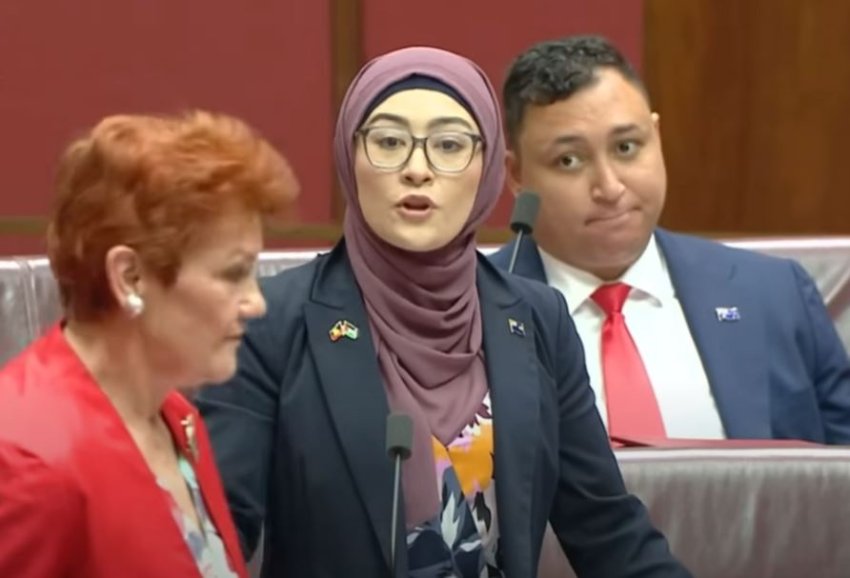
Pauline Hanson, the textbook definition of “white privilege”, has been using her Senate position to normalise and rehabilitate racism for many years, showing that it is acceptable to be racist in Australia’s parliament.
However, this week we’ve seen a few gutsy senators of colour fighting back, at some personal cost. Gunnai, Gunditjmara and Djab Wurrung independent Victorian Senator Lidia Thorpe was denied the right to enter her workplace on the last sitting day of parliament, thrown out for allegedly making the workplace “unsafe” after she ripped up a piece of paper and threw it at Hanson.
This was after Hanson launched yet another racist attack, this time on independent WA Senator Fatima Payman, accusing her of violating Section 44 of the Constitution, which covers citizenship and the right to hold a parliamentary position.
Payman was rightly furious, and tried to hand Labor’s advice on this matter to Hanson, who refused to take it.
Hanson wanted — and got — the Senate to demand Payman retract her labelling of Hanson as racist. But the “rules” allowed Payman to read Hanson’s own words back at her — all clearly racist.
We all know that Hanson is racist, but senators who object to her making the workplace unsafe for them are not allowed to call her out. Meanwhile, Labor’s Senate leader Penny Wong said “safety at work” was why Thorpe had to be suspended.
All of this took place days after the Federal Court upheld Greens Senator Mehreen Faruqi’s complaint against Hanson’s social media post telling her to “piss off back to Pakistan”, which violated Section 18C of the Racial Discrimination Act.
Thorpe told a rally on parliament lawns on November 28 that she would not be silent and, as we’ve seen, neither will Faruqi or Payman.
But Thorpe did lose an opportunity to highlight, in her private Senator’s bill, the incredible power of the attorney-general having a veto on prosecuting genocide.
Thorpe wants to remove such political interference in the legal system and help victims and survivors have “a better chance at justice”.
It is inspiring to see the three women senators using their parliamentary privilege to highlight how entrenched racism is in society and in that institution.
Meanwhile, the Australian Human Rights Commission (AHRC) has issued a new “roadmap” to eliminate racism.
Its National Anti-Racism Framework said racism has “profoundly detrimental effects on people’s lives”, including worse health and educational outcomes, overrepresentation in the justice system, negative representation in the mass media and “consistent roadblocks” in employment.
It made the important point — that racism will not be eliminated by policies that aim for “diversity, equity and inclusion” because they do nothing to tackle a system “built to maintain white privilege”.
The AHRC said even though “race has no scientific or biological basis”, racism is “systemic” and continues to have a detrimental impact on people’s lives.
Australia’s history “defies a homogenous narrative”, it said, pointing to how Indonesian Muslim traders engaged with the Yolngu people as early as 1700; Jews and Africans arrived with the First Fleet; migrants from Egypt, Iran, Turkey and South Asia arrived in the 1830s; and Chinese migration surged in the 1850s.
Yet, it said, “the fallacy of homogeny still informs how our systems and institutions operate and fails to reflect this rich, true identity of the peoples of this nation”.
The AHRC made 63 recommendations.
It calls on the federal government to lead a 10-year national plan, broken into 5-year segments, covering all levels of government and community organisations.
It said there needs to be an acknowledgement of the systemic and structural nature of racism, which includes truth-telling and self-determination for First Nations peoples, as well as adequate funding for programs led by Aboriginal and Torres Strait Islander community-controlled organisations.
It’s an echo of those who said truth-telling was the first essential step during the Voice referendum, before any serious Makarrata Commission and treaty.
However, the AHRC’s recommendations may go the way of the Queensland Truth-Telling and Healing Inquiry, which the Queensland Liberal National Party government is moving to close down.
Tackling racism requires a national discussion about the ongoing impact of colonisation across all institutions, including parliament. The three senators need to be congratulated in taking a lead to call it out.
If you agree, become a Green Left supporter for as little as $10 a month and consider a donation to our 2024 Fighting Fund.